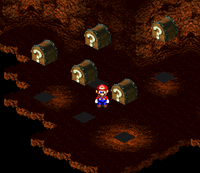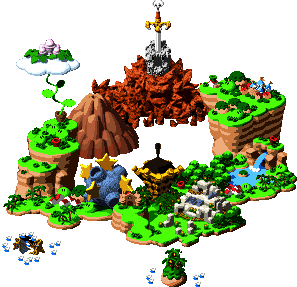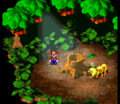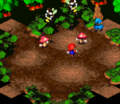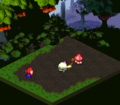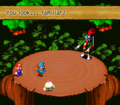Forest Maze: Difference between revisions
LadySophie17 (talk | contribs) No edit summary |
Tag: Reverted |
||
| Line 41: | Line 41: | ||
*[[Octolot]] | *[[Octolot]] | ||
*[[Amanita]] | *[[Amanita]] | ||
*[[Bowyer]] (boss) | *[[Bowyer]] (2nd Star boss) | ||
==Gallery== | ==Gallery== | ||
Revision as of 10:29, January 14, 2024
| Forest Maze | |
|---|---|
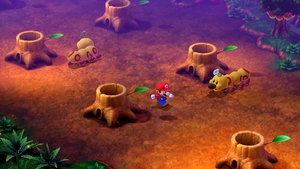
| |
| First appearance | Super Mario RPG: Legend of the Seven Stars (1996) |
| Latest appearance | Super Mario RPG (Nintendo Switch) (2023) |
| Greater location | Mario World |
- “It was amazing, mom! I just saw Geno walk into the forest! Neat, huh?”
- —Gaz, Super Mario RPG: Legend of the Seven Stars
The Forest Maze, also known as Wiggler Forest,[1] is a labyrinth of trees and underground passages found in Super Mario RPG: Legend of the Seven Stars and its Nintendo Switch remake. It includes some underground caverns accessed by traveling down tree stumps as well as some regular forested areas, but the main part is a maze infested with unlimited enemies. Also scattered throughout the forest are Mushrooms that the player can collect.
After Gaz's Geno doll is possessed by ♡ ♪ ! ?, he walks out of Rose Town and into the Forest Maze. Mario and Mallow, upon hearing this from Gaz, give chase to the doll. They eventually arrive at a part of the forest that is taken over by Bowyer, a bow-like creature that is shooting Aeros at Rose Town. While Mario and Mallow spy on Bowyer, an Aero arrives and presents Bowyer with one of the Star Pieces. However, it is at this moment that Geno shows up, and attempts to fight Bowyer. With help from Mario and Mallow, Geno is able to defeat Bowyer and claim the second Star Piece. Afterward, Geno decides to join Mallow and Mario in claiming the remaining Star Pieces to repair Star Road.
The "maze" portion of the forest is navigated by following Geno at first. Eventually, however, he stops appearing. At this point, however, the player is close enough to Bowyer to judge where to go based on the trajectory of the falling Aeros. If a wrong turn is made, the player starts back at the beginning. If the player helps the Toad in Rose Town get back to his house and apologizes for taking his treasures if the player opened any of the treasure boxes inside, the Toad gives directions to a secret area inside the Forest Maze. In the "maze" portion, by going left, left, straight, and right in relation to Mario's perspective, it leads to the Treasure Room.[2] The room contains two flowers, two mushrooms that restores the party's HP and FP, and a Frog Coin.
Later, in Seaside Town, there is a Toad called the Mushroom Boy that can taste a Mushroom collected here or bought to see if it is a rare Mushroom.
In the children's book, Mario and the Incredible Rescue, Mario, Luigi and Toad go to Forest Maze in search for one of the six magic mushrooms. After finding the orange mushroom, the trio fights two Hammer Brothers.
Music
On the Super Mario RPG Original Sound Version soundtrack, the music for the Forest Maze is titled 森のキノコにご用心 (Mori no Kinoko ni Go Yōjin), which is translated into "Beware of Forest Mushrooms" in the remake's Sound Player.
A few notes of the track can be heard in the Toad Town, Peach's Castle and Dimble Wood themes in Mario & Luigi: Bowser's Inside Story. Being that Yoko Shimomura is responsible both for Super Mario RPG's music and the music in the Mario & Luigi series music, it is possible that this is intentional.
| File info |
Treasure
- Croaka Cola (hidden) X2
- Flower (hidden)
- Frog Coin (hidden)
- Empty chest (hidden)
- Red Essence (hidden)
- Second Star Piece
Enemies
Gallery
Mallow attacking an Amanita with his Froggie Stick.
Names in other languages
Forest Maze
| Language | Name | Meaning | Notes |
|---|---|---|---|
| Japanese | ハナチャンの森[?] Hanachan no Mori |
Wiggler's Forest | |
| Chinese | 花毛毛森林[?] Huā Máomao Sēnlín |
Wiggler Forest | |
| Dutch | Dwaalbos[3] | Wander Forest | |
| French | Dédale de la Forêt[4] | Forest Maze | |
| German | Irrwald[5] | Forest Maze | |
| Italian | Dedalo boscoso[6] | Wooded maze | |
| Korean | 꽃충이의 숲[?] Kkochchung-iui Sup |
Wiggler's Forest | |
| Spanish | Laberinto Boscoso[7] | Wooded Labyrinth |
Wiggler Forest
| Language | Name | Meaning | Notes |
|---|---|---|---|
| Japanese | ハナチャンの森[?] Hanachan no Mori |
Wiggler's Forest | |
| Chinese | 花毛毛森林[?] Huā Máomao Sēnlín |
Wiggler Forest | |
| Dutch | Wigglerwoud[8] | Wiggler Forest | |
| French | Forêt de Wiggler[9] | Wiggler's Forest | |
| German | Wiggler-Wald[10] | Wiggler Forest | |
| Italian | Foresta Torcibruco[6] | Wiggler Forest | |
| Korean | 꽃충이의 숲[?] Kkochchung-iui Sup |
Wiggler's Forest | |
| Spanish | Bosque Floruga[11] | Wiggler Forest |
References
- ^ @NintendoUK (September 28, 2023). Twitter. Retrieved September 28, 2023.
- ^ Miller, K. 1996. Super Mario RPG: Legend of the Seven Stars Nintendo Player's Guide, pg 37.
- ^ @NintendoNL (October 3, 2023). Twitter. Retrieved October 3, 2023.
- ^ @NintendoFrance (October 4, 2023). [NintendoFrancehttps://twitter.com/NintendoFrance/status/1709523762901639589 Twitter]. Retrieved October 4, 2023.
- ^ @NintendoDE (October 3, 2023). Twitter. Retrieved October 3, 2023.
- ^ a b @NintendoItalia (September 28, 2023). Twitter. Retrieved September 28, 2023.
- ^ @NintendoES (October 3, 2023). Twitter. Retrieved October 3, 2023.
